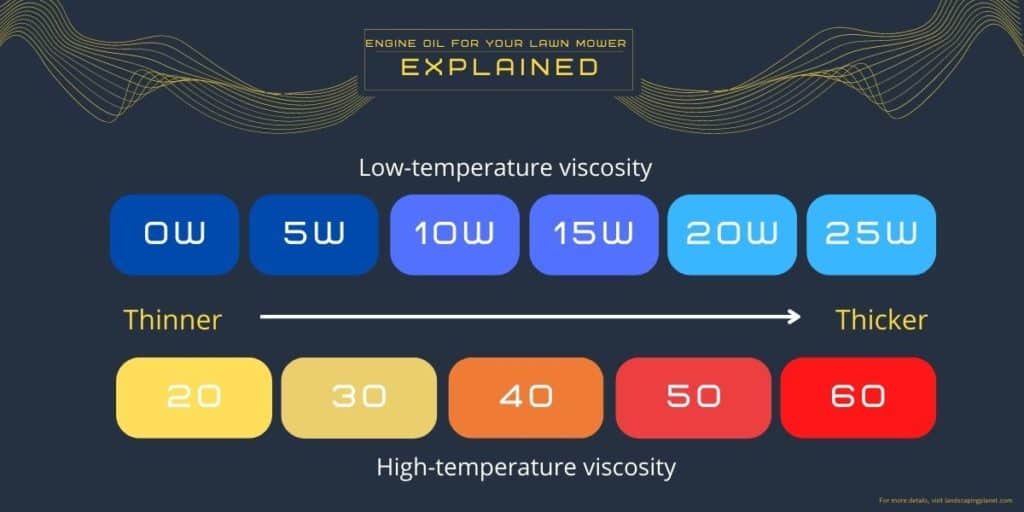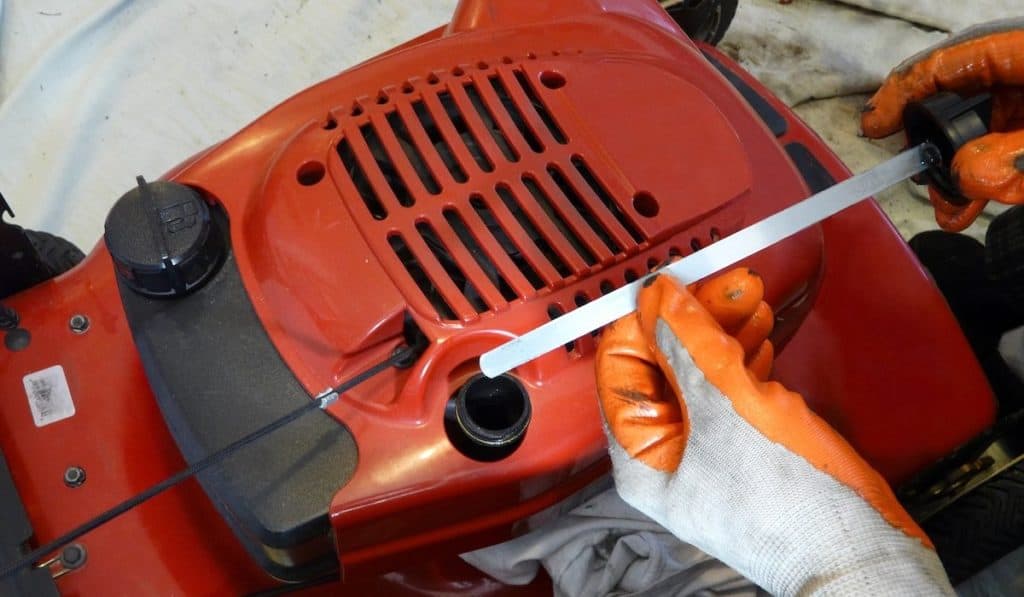Having power equipment like lawnmowers makes landscape beautification less stressful. However, you must maintain the equipment regularly to keep it working effectively. Adding the right kind of oils to your lawn mower is one way to maintain it and extend its lifespan.
Generally, you can use 5W30, SAE30, SAE 5W-30, 15W-30, and other recommended engine oils in your Lawn mower. However, The right type of oil depends on the engine type, outdoor temperature, and the lawn mower brand. You should avoid oils with a viscosity of 40 as they are too thick for lubrication.
The rest of this post contains detailed explanations of all you need to know about the right oils to use in a lawn mower for maintenance.
What Factors Determine the Kind of Oils You Should Use?
You have to be more careful with the oils you choose for your lawnmower, as you can’t use every option available. A few factors like outdoor temperature, type of lawn mower, and engine type will determine the kind of oil you should use on a lawn mower.
Still, the best oil for your lawn mower is any or class of oils recommended by the manufacturers of your mower. You can find this information in the machine’s manual.
Let’s look at these factors that determine the kind of oils to use on a lawn mower.
Mower’s Engine
All Mower engines aren’t the same. Hence, you should try to understand the type of engine you have in your mower. There are two main types of lawn mower engines: two-cycle and four-cycle.
A two-cycle engine has one compartment that stores a mixture of fuel and oil.
You’ll do this mixture in a specific ratio and apply it to your engine’s tank. You can check the owner’s manual for the most suitable oil for an engine like this and the application ratio. However, lightweight synthetic oil blends or small engine oils are best for two-cycle engines.
These engines also need oils with API performance ratings of SF, SG, SH, SJ, or higher.
By contrast, four-cycle mower engines have separate compartments that hold engine oils and fuels.
Standard motor oils with a viscosity of 30 will work effectively in four-cycle engines. These oils come in different forms:
- Synthetic blends.
- fully synthetic.
- Traditional oils.
Outdoor Temperature
Outdoor temperature can negatively affect the efficiency of engine oils if it’s not suitable for that environment. If you mow your lawn in warmer temperatures, a SAE30 oil will be perfect for your mower’s engine.
For colder temperatures, you can use SAE 5W-30 for effective performance. If your temperature range is between 0 and 100 degrees, an SAE 10W-30 with guaranteed viscous stability across varying temperatures will be suitable for your mower engine.
More importantly, the outdoor temperature will significantly influence the oil type in four-cycle engines.
Types of Lawn Mower Oils
There are two types of oils you can use in your lawn mower. They are:
- Motor Oil – The motor oil is suitable for four-cycle lawn mower engines where oil and fuel enter different compartments. Motor oils are mostly multigrade synthetic or synthetic blend oils with viscous stability across different temperatures. They are for large engines, motorcycles, and automobiles but will work in lawnmowers with similar engine designs.
- Small Engine Oil – Best for small engines like chainsaws, smaller lawn mowers, and weed eaters that use two-cycle engines. Small engine oils typically have additives to reduce carbon residues and wear in the machine.
- Mineral or Conventional Oils – These natural oils are byproducts of refined crude oil. They are often cheaper and readily available than other oils. Mineral oils and their synthetic counterparts will work perfectly on older mowers. In contrast, newer engines perform better with synthetic oils. However, you should follow the recommendations from the manufacturer.
- Synthetic Oils – These are laboratory products that have undergone a series of high-end refining. Mineral oils serve as base oils in the production of synthetic oils in laboratories. They are suitable for varying temperatures and have better oil properties than their mineral counterparts.
- Synthetic Blends – Synthetic blends combine mineral oils and synthetic chemicals to produce high-quality oils. The mineral oil serves as the base oil while additives complement it to improve performance, protection, longer breakdown time, and suitability for all weather conditions.
The notable difference between synthetic oils and synthetic blends is the quality of the base oil and additives manufacturers use during production.
Oils You Can Use in Your Lawn Mower

Below are the different kinds of oils to use in a lawn mower:
SAE 30
The SAE30 is a type of mineral oil with a single rating (only for normal and higher temperatures). It’s the best option for smaller engines since it’s lightweight and has a viscosity rating of 30. It’s best used in temperatures from 40 degrees Fahrenheit (4.44°C) and above.
SAE 40
SAE30 and 40 are similar mineral oils with a single rating. They are best for small engines. They also perform well at normal or higher temperatures. However, the difference between them is in their viscous levels. SAE40 is higher and will be thicker in hotter weather than SAE30.
SAE 5W-30
The SAE 5W-30 is a multi-grade oil suitable for lower temperatures below 40 degrees Fahrenheit (4.44°C). It’s the best type of oil to use in winter to prevent friction and clogging of your mower’s moving parts. Since it’s multi-grade, you can safely use it in regular or higher temperatures.
SAE 10W-30
The SAE 10W-30 is suitable for varying temperatures and good for use in colder regions when your engine needs to warm up a bit. The only downside to this oil is that it finishes faster than the rest.
Synthetic SAE 5W-30
This is the synthetic version of the 5W-30 oil. It’s a multi-grade oil best for low and high temperatures. Engines won’t burn through the oil quickly due to the consumption rate. It’s a good choice if you want a lawn mower oil that will last longer overall.
Vanguard 15W-50
The vanguard oils are suitable for all temperatures and best for consistent usage, especially if you mow lawns commercially. However, you don’t have to buy four-liter gallons if you want to use this oil for your private landscaping needs. There are smaller packs you can use.
When To Change Your Oils
Generally, you should change the oil of your new lawn mower’s engine after the first five hours of operation. For older engines, replace oil after using them for more than 25 hours and after 50 hours for larger mowers.
Some factors, like the size of your lawn, dust, dirt, and higher temperatures, can affect the need to replace your oils. If you work under more strenuous conditions, you should check your oil levels regularly to know how much is left.
A dipstick can help you check this accurately the same way you do with an automobile engine. If the oil level on the dipstick is lower than the full or add mark, you should top it.
Still, it’s best to stick with the manufacturer’s recommendation when replacing your mower’s engine oil.

Is 10W40 Good for a Lawn Mower?
A 10W40 oil is multi-grade premium oil with a viscosity (thickness) of 40. It can perform well at hot and cold temperatures. This doesn’t mean it will be suitable for a lawn mower. It’s the best oil for automobile and motorcycle engines.
Manufacturers typically design lawn mowers to use single-grade oils having a viscosity rating of 30.
So, a 10W40 with higher viscosity of 40 might be too thick for your mower engine and won’t lubricate its parts properly. Moreover, the 10W40 is a multi-grade oil that will be overkill for a small two-cycle engine.
Generally, 10W40 oils do not meet the requirements to function optimally in smaller engines.
However, you can use the 10W40 oil if the mower engine permits 40-weight oils. In many cases, that engine has to be a four-cycle variant.
Most manufacturers will recommend using 10W40 oil only if you can’t find suitable 10W30 or SAE30 oils.
What Happens if I Use 10W40 Instead of 10W30?
Using a 10W40 oil on a lawn mower will lead to wear and tear in the engine because the oil will be too thick for lubrication. A 10W40 oil has a higher viscosity rating of 40, which makes it thicker than a 30 rating at warm or regular temperatures.
Your mower’s engine will only perform well with a 10W40 oil if it’s older and leaks oil frequently. You can also use it if the mower manufacturer recommends it.
An older machine will burn more engine oil and could use the high viscosity of a 10W40 oil since its oil passages are all worn out. The leaking engine also means that some of the viscous fluids will flow out and reduce the volume of oil in the engine.
Is SAE40 the Same As 10W40?
SAE 40 and 10W40 oils aren’t the same. For starters, SAE 40 is a single-grade oil, implying that it has a single rating for high and regular temperatures. So, it won’t be effective in colder temperatures.
The SAE40 is effective at normal and high temperatures where it can sustain viscosity. The 40 represents the thickness of the oil at normal and warm temperatures.
On the other hand, 10W40 is a multi-grade oil with double ratings for hot and cold weather conditions. Therefore, it can perform optimally at regular warm temperatures and at lower temperatures by sustaining its lightness.
‘W’ in the 10W40 stands for winter, implying that it’s suitable for cooler temperatures, while the number 10 is the SAE grading for the lowest temperature.
The SAE (Society of Automotive Engineers) assigns these values to oils starting from 0W, 5W, and 10W down to 25W. At 10, it means this oil can still lubricate optimally low temperatures.
The number ’40’ is the oil’s viscosity rating, which is just above average. So, the oil can function well at regular and higher temperatures.
Does 10W40 Hurt 10W30 Engine?
A 10W40 oil hurt a 10W30 engine because it doesn’t align with its API rating. Small engines like lawnmowers do not require high-viscosity oils to disperse heat and reduce friction in their moving parts.
A high-viscosity oil will be too thick at normal temperature, so the oil won’t flow freely for lubrication. You should only use 10W40 oil in a 10W30 engine when you use it in winter.
That way, the 10W40 oil will sustain its lightweight property and lubricate properly regardless of low temperatures. Yet, it’s a violation of the recommended oil usage, and you shouldn’t use it for too long unless you can’t find a 10W30 oil in time.
Can You Use 5W30 in a Lawn Mower?
You can use a 5W30 oil in a lawn mower. It’s a multi-grade oil suitable for your engine at all temperatures. However, it’s best for almost freezing temperatures due to its SAE winter rating of ‘5’ just above ‘0’, which is the lowest.
Leading gasoline engine producers Briggs and Stratton recommend the 5W30 oil for lawn mowers so you can count on it to protect your machine at warmer temperatures.
Things To Note When Looking for the Right Oil for Your Lawn Mower
When looking for the right oil for your mower, here are a few things to keep in mind:
- Ensure there are no special additives in their composition.
- You can use synthetic oils, but they are more expensive.
- Do not use motor oils for smaller lawn mowers.
- When in doubt, always check the manufacturer’s manual.
Conclusion
Getting more years and optimal performance out of your lawn mower requires adequate maintenance. You can achieve this with the perfect oils and knowing when to replace them. A good place to start is with the manufacturer’s oil recommendations.
Generally, you won’t go wrong with SAE30, 5W30, 10W30, and other oils within the 30-viscosity rating suitable for small engines. You’ll also need to pay attention to your outdoor temperature and the kind of engine in your lawn mower when choosing these oils.

